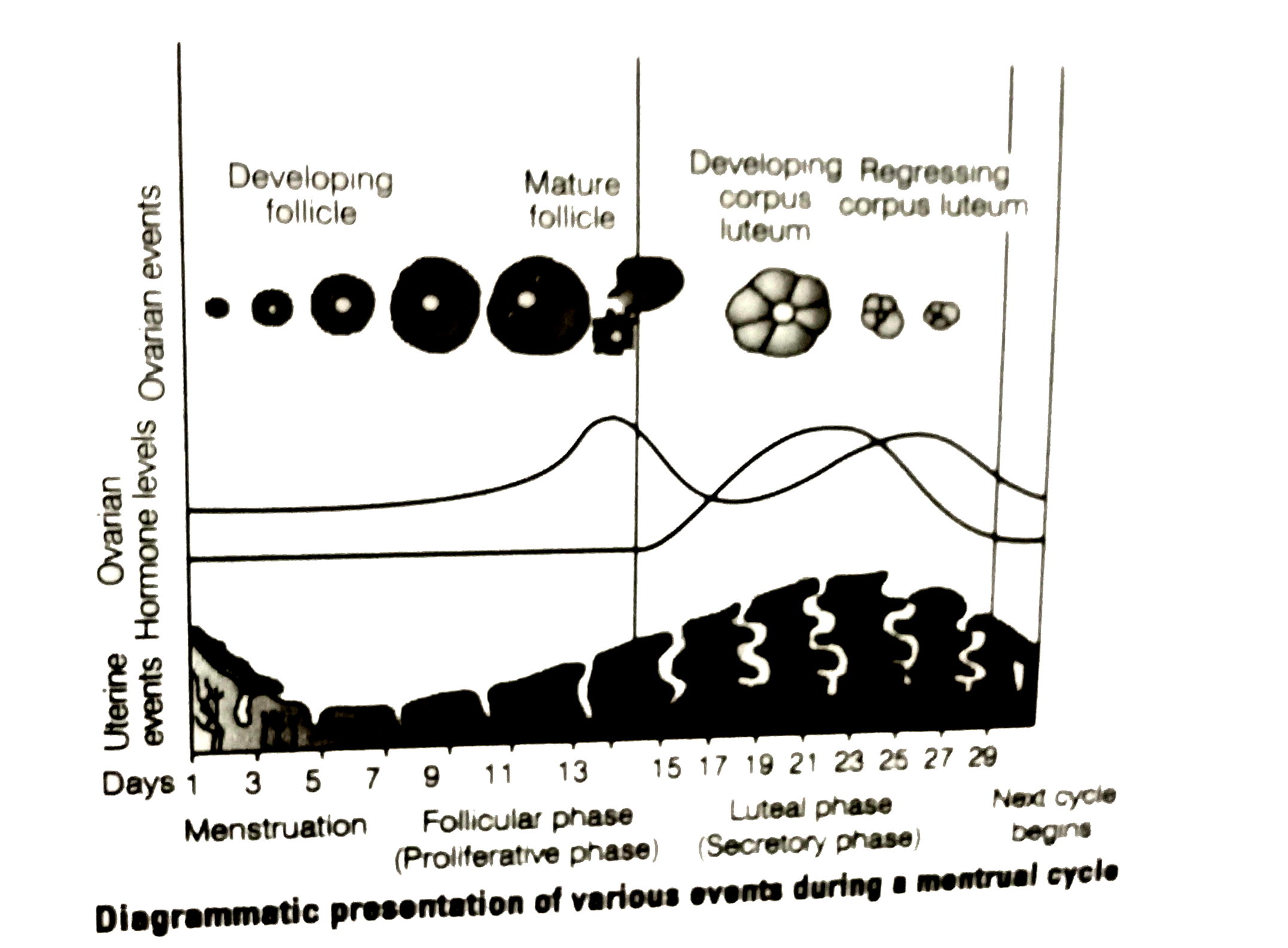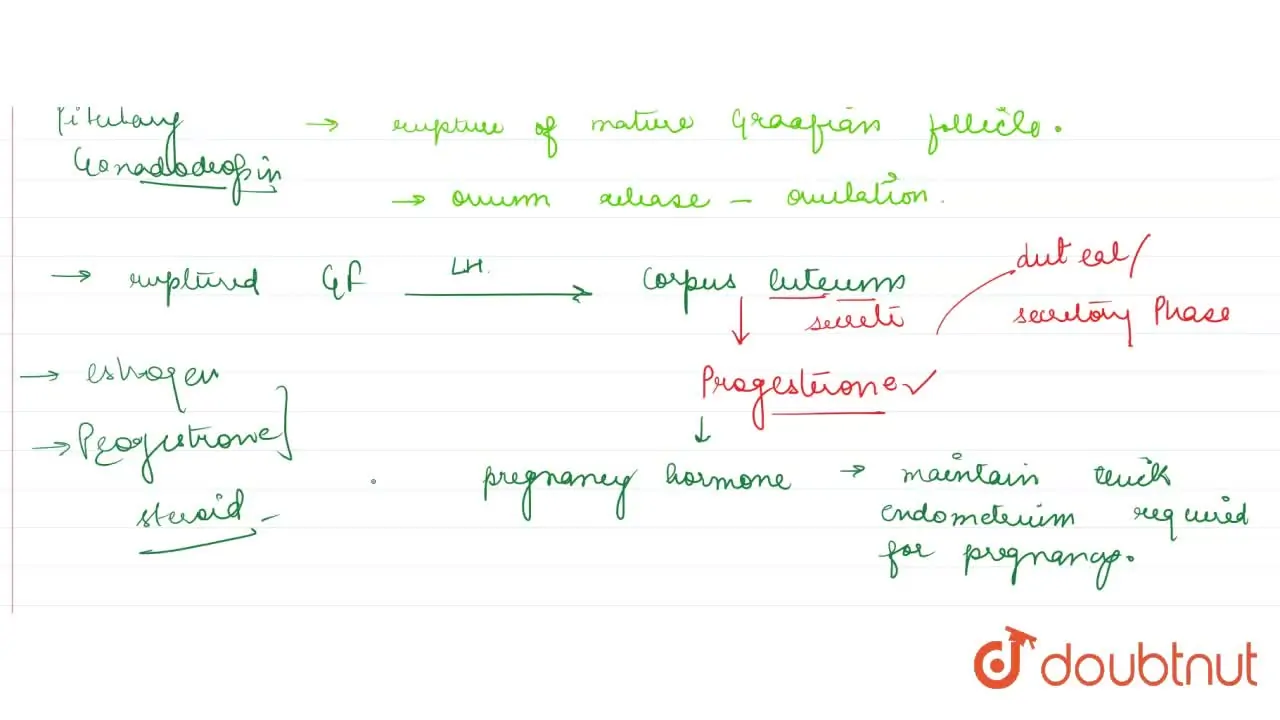What role does pituitary gonadotropins play during follicular and ovulatory phases of menstrual cycle? Explain the shifts in steroidal secretions.
Menstrual Phase (1-5 days)
Endrometrium breaks down the cell of endometrium secretions unfertilised ovum constitute menstrual flow. Progesteron production is reduced
Follicular Phase (6-13 days)
Endometrium rebuilds, FSH and oestrogen secretion is increased.
Ovulatory Phase (14-16 days)
Both LH and FSH attain peak level. Estrogen level is also high. It leads to ovulation.
Luteal Phase (16-28 days)
In adsence of fertilisation corpus luteum secretes progesterone. Endometrium Thickens and uterine glands become secretary.
The menstrual cycle starts with the menstrual phase, when menstrual flow occurs and it laste for 3-5 days. It results due to breakdown of endometrial lining of the uterus and its blood vessels.
Follicular Phase The menstrual phase is followed by the follicular phase.
During this phase, the primary follicles in the ovary grow to become a fully mature Graafian follicle and simultaneously the endometrium of uterus regenerates through proliferation. These changes in the ovary and the uterus are induced by changes in the levels of pituitatary and ovarian hormones.
 The secretion of gonadotropins (LH and FSH) increases gradually during the follicular phase and stimulates follicular development as well as secrtion of estrogens by the growing follicles. Both LH and FSH attain a peak level in the middle of cycle (about 14th day).
The secretion of gonadotropins (LH and FSH) increases gradually during the follicular phase and stimulates follicular development as well as secrtion of estrogens by the growing follicles. Both LH and FSH attain a peak level in the middle of cycle (about 14th day).
Rapid secretion of LH leading to its meximum level during the mid-cycle LH surge induces rupture of Geaafian follicle and thereby the release of ovum (ovulation). The ovulation (ovulatroy phase) is followed by the luteal phase during which the remaining parts amounts of progesterone which is essential for maintenance of the endometrium.
Such an endometrium is necessary for implantation of the fertilised ovum and other events of pregnancy. In the absence of fertilisation, the corpus luteum degenerates.
This causes disintegration of the endometrium leading to menstruation.
Related Playlists
- BOOK - NCERT EXEMPLAR ENGLISHCHAPTER - HUMAN REPRODUCTION EXERCISE - SHORT ANSWER TYPE QUESTIONS10videos
HUMAN REPRODUCTION
- BOOK - NCERT EXEMPLAR ENGLISHCHAPTER - HUMAN HEALTH AND DISEASESEXERCISE - All Questions69videos
HUMAN HEALTH AND DISEASES
- BOOK - NCERT EXEMPLAR ENGLISHCHAPTER - MICROBES IN HUMAN WELFARE EXERCISE - Long Answer Type Questions6videos
MICROBES IN HUMAN WELFARE
Similar Questions
Follicular phase of menstrual cycle is the other name of :
View SolutionLH surge occurs during which phase of menstrual cycle ?
View SolutionWhat are the events that take place in the ovary and uterus during follicular phase of the menstrual cycle.
View SolutionWhat are the events that take place in the ovary and uterus during follicular phase of the menstrual cycle.
View SolutionWhat role does thromboplastin play?
View SolutionWhich of the following is not related to follicular phase of the menstrual cycle?
View SolutionWhich of the following hormones is active during proliferative phase of menstrual cycle?
View SolutionWhat role does calcium and sulphur play in plants
View SolutionWhat role does the molecular interaction play in a solution of alcohol and water ?
View SolutionDuring the follicular phase of a normal menstrual cycle ovarian changes occur which are due to pituitary secretions of
View Solution


